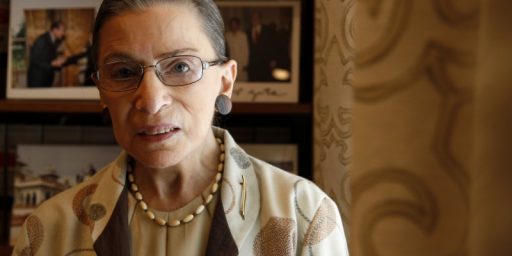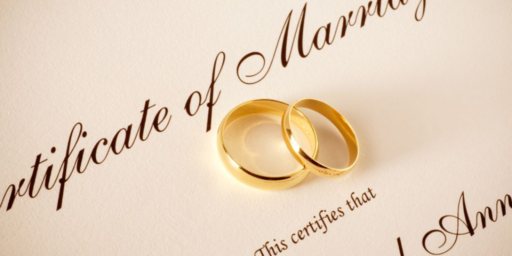Redefining Marriage
Jeff Jacoby claims that marriage cannot be redefined.
 Writing for the BoGlo, columinst Jeff Jacoby opines: Marriage cannot be redefined.
Writing for the BoGlo, columinst Jeff Jacoby opines: Marriage cannot be redefined.
In the piece he two basic points:
First, gay marriage is not analogous to interracial marriage:
Marriage is designed to bring men and women together; anti-miscegenation laws frustrated that design, and could not stand.
As far as arguments against same-sex marriage go, this is quite circular because he is basically saying anti-miscegenation is not relevant to same-sex marriage, because marriage is male-female only. Really, bringing up interracial marriage here is superfluous, as the real point he wants to make is that marriage equals male+female. Of course, if he had said that, it would have been a very short column.
The irony of Jacoby’s argument is that the very fact that there were laws forbidding interracial marriage demonstrates the degree to which marriage has been a creature of legislation. And, as I noted the other day, the involvement of government in marriage is essentially escapable. So, at least from a legal point of view, marriage has been redefined in living memory.
His second point is pretty standard boilerplate:
The essential, public purpose of marriage is to unite male and female–to bind men and women to each other and to the children that their sexual behavior may produce. It is rooted in the belief that every child needs a mother and a father.
As Norman Geras notes:
He starts with a conjunction – ‘to unite male and female’ and bind them to their biological children – but finishes only with one of the items paired. For, if marriage can unite a man and a woman, there’s no reason it can’t also unite a man and a man or a woman and a woman. Therefore Jacoby has to rest his case on binding the married couple to the children they produce. But as it is, some marriages don’t produce children; and nearly every marriage has other important purposes and functions than producing children. So his is an attempt to freeze the institution of marriage by arbitrarily making it less than it has always been.
Indeed.
I will note that I am pro-procreation and not just in the abstract, as I have three sons. However, as much as I love my children and as much of my time and resources go into them, their existence is hardly the sole defining characteristic of my marriage (which, as timing would have it, turns 21 today). Indeed, my wife and I were married for six and half years before we had our first child and while there was an assumption that we would have children at some point, it was never a guarantee (as many infertile couples can attest). As such, what was the fundamental purpose of our marriage during that span of time? Well, to use Jacoby’s phrase, it was to bind us to each other.* And, I would note, once the children move out, I expect our marriage to remain a central part of my life.
And really, the idea that marriage cannot be redefined simply isn’t true. The discussion of interracial marriage points out a clear example of legal alterations in regards to marriage and this also reminds me an example that has been rolling around in the back of my head for time: the story of the Jewish Patriarch, Jacob, who was later called Israel and was the father of the heads of the Jewish tribes that figure so prominently in the Bible.
If one reads Genesis 29:16-30:22 we see a couple of things:
1) The idea of a bride price (29:15-18): Jacob agrees to work for seven years in order to marry Rachel. Last time I checked, most societies have done away with the bride price. Further in most cultures the father does not have the power to decide for the daughter who her groom will be.
2) The father giving a different daughter instead: In verse 23 we find that the father delivers not the Rachel (who was beautiful), but instead Leah (who had “weak eyes”). Jacob must’ve had a lot of wine at the feast, because he doesn’t realize that he was with (in the Biblical sense) Leah until the next morning after. Part of the explanation is that “It is not our custom here to give the younger daughter in marriage before the older one.” I am pretty sure we did away with that rule a while ago as well in most cultures.
3) More bride price, because to get to marry Rachel as well, Jacob has to work for another seven years!
4) Bigamy!! Yes, in verse 28 he marries Rachel, but stays married to Leah. Again: not exactly what most proponents of “traditional” marriage have in mind. Really, we could stop here, but then that would be leaving out the saucy bits (lots of Biblical “knowing” takes place from here on out).
5) The story gets better, at least from a “sanctity of marriage” point of view, insofar as both women get into a contest (my characterization) to see who can have more sons for Jacob. When Leah of the Weak Eyes bears several sons, Rachel gets really upset that she has not yet had any sons. Her solution is to give Jacob her servant, who then bears a son (who is then claimed by Rachel as her own, which doesn’t really seem fair). As such, we have here adultery and exploitation of the servants. All of this is in the first few verses of Genesis 30).
6) This contest continues, by the way, with Rachel also giving her servant to Jacob to help with the son production effort. Eventually 1 sons are produced. The wives feel as if that have been blessed, and Jacob is a very tired man. No word, however, on the disposition of the two female servants.
So, in short, this tale contains:
a) Fathers arranging marriages with no evidence of consultation with daughters.
b) The groom paying to marry.
c) Bigamy.
d) Sanctioned adultery.
None of this sounds anything like the contemporary definition of “marriage” in the United States. So, I guess Jacoby is wrong, because it would seem that marriage can be redefined (and has been over the millennia). I suppose his response would be that the pairings noted above are all heterosexual in nature, and I would not dispute that. However, good luck trying to get the above scenario sanctioned in a US court. (Although this does make me thingk that HBO could do a reprise of Big Love using the above plot.)
And, we have to add to this that the tone of the entire story is hardly one of condemnation. Indeed, the eleven sons who are the results of the above soap opera become the heads of the Twelve Trials of Israel (the twelfth son, Benjamin is born later), and Jacob is seen as blessed. Indeed, in the passage referenced above, each time a son is born (whether of a wife or a servant) the wife in question declares that she has been blessed of the Lord.
And this is not the only example of polygamy in the Bible (Solomon comes to mind as well).
I suppose my point is twofold. First, that the notion that marriage has had a set meaning for all of time is simply not true, and hence redefinition is possible. Second, the basic idea that even “Biblical marriage” is a cut and dry concept is problematic. Of course, on that last point the professional theologians in the audience can help me out on how I am wrong.
I just find it odd that if God was in fact quite focused on the concept of one man and one woman as the key definition of marriage why the Jacob-Leah-Rachel triad (not to mention the two servants)is not condemned and why a fellow involved in this kind of arrangement was made into one of the greatest patriarchs in the Torah. At a minimum, it would seem something of a mixed message.
___
*For the Doctor Who fans in the audience, consider it the lovey-dovey, bindy-windy part of the arrangement.






Taken out to an extreme interpretation, if a married couple are incapable(or unwilling) to have children, and marriage is primarily about procreation, then those marriages would have to be nullified or they couldn’t receive any benefits from the marriage.
There is also the story of David and Jonathan in the book of Samuel.
Playing Devil’s Advocate for a bit here…
There’s an important point missing from your biblical analysis, Steven. During the times you describe, there was a prohibition against male homosexuality (I haven’t seen a similar prohibition for female homosexuality, but I certainly don’t claim complete knowledge of The Bible). So while marriage hasn’t been immutable over the millenia, it has been immutable in that same-sex marriage has never been envisioned until recently.
@Boyd:
Except that I am not trying to use the example as being pro-homosexuality, but rather to point out the definition of marriage is more mutable than many assert. And, further, that culture clearly comes into play in said definitions.
A movement to redefine every single existing marriage and all future marriages in the United States started in the 1970’s. This redefinition would not be considered consistent with the biblical definition of marriage. Strangely, the process finally finished up last year and no one seemed to make that big of a fuss over it.
@Boyd: There is some controversy over that prohibition. Some Biblical scholars interpret the prohibition to be against the use of temple prostitutes in worship, as the pagans did when the Jews were slaves.
So in essence, God was telling the Jewish people to separate themselves from the old ways, and that meant no pagan rituals and using sex as a means of worship…
Marriage has many benefits to the State, as it were, and bonding for support of the progeny is only one of them.
I am supporting my boyfriend now since he had to take off work full time to go back to school, get his state license and start his own business. One day he hopes to own his own shop, and employ others to work for him. Without the benefits arranged for us as domestic partners (the closet analogue we had at the time to marriage here in California), he might not have done it.
We still haven’t made any other of the fairly complex arrangements yet to help fill in the various legal benefits/responsibilities for each other than comes with a marriage certificate on file with the State (which is what….2 people signing their name, with a couple of witnesses and a certified over-seer to sign off on it, and then placed on file in the Registrar’s office? Wow! How religiously reverent!) . Such as health care provisions, inheritance (although I do have a holographic will), and other financial/legal provisions….
But I guess, that’s OK…it’s not like we formed a life together or anything, and each paid some cost for that but made the USA a little better for it, yet don’t get any of the benefits outside of our own personal satisfaction…
The legislative construction of marriage even predates the ban on interracial marriage. Slaves weren’t allowed to marry and even after the Civil War, at least here in Virginia, blacks could only obtain what was called a “certification of cohabitation”.
There was no legal prohibition against homosexuality in the Roman Empire. (The predominate political entity at the time the bible was supposedly written.) The prohibition against homosexuality in the Roman Empire didn’t occur until after the Christians took over the Eastern Empire and Emperor Constantius II declared it not only illegal in 342 AD but the punishment was death. There are examples of same sex marriages occurring as far back as Ancient Egypt as well as in the Roman Empire and in Ming Dynasty China.
From a Libertarian/freedom point of view, no government should have anything to do with honoring one form of adult consensual relationship over another. There is no such reason why a two-person relationship, same-sex or different sex, should be recognized as superior to a five-person relationship. Why not just let whatever group of people wish to share “sex,” property, medical records, and death benefits, do so?
Except that man-woman relationships produce the next generation, and exclusive long-term man-woman relationships seem to have some evidence for being the best way to raise that generation – perhaps that is the reason the one-man-one-woman marriage should receive a preference.
From a Bible point of view, Genesis 2:24 is pretty clear: marriage is one man with one woman for life. In this context, all other formats must be regarded as inferior. The first polygamous set-up mentioned is in Genesis 4:19, a descendent of the murderer Cain takes two wives, and becomes a boastful murderer himself. By Genesis 6:2, multiple marriages seem common. Then, we read of all of the gyrations with Jacob described in the article above.
By the book of Exodus (6:20), we find that Moses’ dad married his own aunt. Such a relationship was then later forbidden by God as spoken to Moses in Leviticus 18:12. Homosexual acts were also forbidden in Leviticus 18:22, and has no restriction to pagan worship practice at all. Jesus Christ endorsed Leviticus 18:12-22 and the entire work of Moses in John 5:46-47.
God suffered Moses to authorize written divorce notices in Deuteronomy 24:1 as a provision for social order among a people who were cruel to one another.
In Matthew 19:16, Jesus Christ makes it very clear that the BIble defintion of marriage remained invariant: one man, one woman, faithful until death. The closer we can hew to that, the better off we are.
So yes, men have re-defined, and re-defined, and re-defined “marriage”. And they coarsen the world with every attempt that does not hold the original definition as the ideal.
My own opinions on same sex marriage are still evolving. But Jacoby’s insistence that a society and government simply can’t redefine marriage is silly. If we can redefine person, which we’ve done several times, we can certainly redefine the nature of what is essentially a contractual relationship.
Or maybe Jacoby feels that articles of incorporation violate natural law. I kind of doubt it.
Lewis Carroll on redefining words:
‘That’s a great deal to make one word mean,’ Alice said in a thoughtful tone.
‘When I make a word do a lot of work like that,’ said Humpty Dumpty, ‘I always pay it extra.’
Are we already living in wonderland?
Coarsen the word marriage? Who could coarsen the word marriage more than Henry VIII?
These arguments, that SSM is some abomination that will totally wreck the institution of marriage and that there is no possible way that SSM is the same thing as “real” marriage, seem like the last desperate gasps of a losing side in a debate…no doubt there was similar huffing and puffing when segregation and miscegenation laws were thrown into history’s trashcan…
Here is something I have never seen addressed specifically on the question of marriage. It is true that in the Catholic faith if you are not catholic, married by a catholic priest, in a Catholic church, you are not married. All of us who are not Catholic are not married in the eyes of the Catholic Church. There are also other religions who have similar views in that they do not recognize the married status of other faiths to some degree or another (of course some do recognize the marriages of other faiths). If religions can willy-nilly declare some people “not married”, why is it that their views on marriage as an institution are even considered in the debate for the country as a whole?
The point in bringing this up is that if the any government can declare the parameters for a sanctioned marriage could they not also insist that all religions recognize those marriages as well? I mean after all if the federal government puts themselves in the position of the arbiters of what an “official” marriage is, why can they not compel every organization in the country to recognize the union as well?
This is the reason why I think that “marriage” as a religious institution should be left up to individual churches and the government only get involved in the aspects of marriage that have civil repercussions (inheritance, benefits, ect.). In other words, all “marriages” from the government’s point of view should be strictly civil unions and only churches should be involved in marriage. Otherwise you have a very real potential for the government to stick its nose into religious matters. (we already have too much religion sticking its nose into the government.)
@The unoriginal Herb: First, hilarious that you’re still using “The Unoriginal. Herb” handle.
Second, not sure if we’re living in Wonderland, but we do live in a country that values life, liberty and the pursuit of happiness over strict dictionary interpretations of words. Indeed dictionary.com includes such definitions for marriage as:
No one is arguing these are illegitimate uses of the word, although they do deviate from the established “definition” of marriage as being “1 man, 1 woman.”
Of course, it doesn’t help when Item #1 includes this nugget:
“There’s an important point missing from your biblical analysis, Steven. During the times you describe, there was a prohibition against male homosexuality (I haven’t seen a similar prohibition for female homosexuality, but I certainly don’t claim complete knowledge of The Bible). So while marriage hasn’t been immutable over the millenia, it has been immutable in that same-sex marriage has never been envisioned until recently.”
See, this always confuses me.
I realize that Mr. Taylor is refuting an “argument” from Mr. Jacoby, a Christian, and so of course Mr. Taylor is correct to bring up the Bible (Mr. Jacoby started it, so to speak.)
But – in what way is what is written in the Bible relevant to public policy concerning marriage?
As Mr. Taylor ably demonstrates here, the case against same-sex marriage pretty much always boils down to “it’s wrong because marriage is between a man and a woman”.
And yet no reason is stated.
And the unsaid part is this: it says so in the Bible.
But, again, how is that relevant?
Mr. Jacoby is Jewish. I apologize – that was a dumb mistake on my part.
This is an important question, as it explicitly ties our public policy back to purely religious principles.
As far as the stuff from Leviticus, perhaps my favorite video on this subject, is some bigot lecturing about how Leviticus prohibits “the gays” and missing the fact that the tattoos that he’s covered with are also banned by Leviticus 19:28.
On the structures of marriage and child rearing:
As the resident anthropologist, let me remind that many cultures have institutions that roughly translate as “Marriage” that definitely go beyond one man and one women and into a wealth of different relations. As far as child rearing, also note that in many other cultures (outside those who have strong ties to the Book), there is often a very structure system by which in-laws raise each others children (though in most part everyone is co-present because its a communal system).
Clearly the slippery slope of allowing heterosexuals to marry has resulted in gay marriage. So we must immediately outlaw all marriages to save families and society from the scurrge of marriage and it’s expansive tendencies.